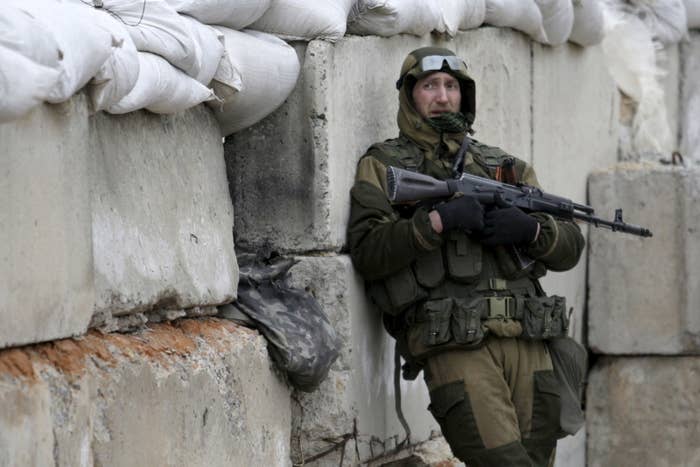
A flare-up in fighting in eastern Ukraine over the weekend has raised new uncertainty about how the White House's new occupants feel about the conflict, given President Donald Trump's desire for closer relations with Russia.
The town of Avdiivka, which is on the front lines in the stalemated conflict between the Ukrainian government and Russian-backed separatists, is due to be evacuated after clashes between the two sides on Sunday. The 8,000 people in the government-controlled city currently have no access to electricity or heat in the middle of the Ukrainian winter. Both sides claim multiple casualties.
The Obama administration loaded several rounds of economic sanctions onto Russia in response to its actions in Ukraine, starting in 2014, in an attempt to pressure the former superpower first into renouncing its claim on Crimea and then later expanded to prompt Moscow to end its support of the rebel forces in the country's east. President Trump has repeatedly said that he'd be open to dropping the sanctions on Russia, though he has yet to clarify precisely what would trigger their being revoked. At one point, he implied that — rather than pulling out of Ukraine — he'd be willing to waive the sanctions in exchange for Russia taking action to reduce its nuclear arsenal.
Four days after the fighting began, US Ambassador to the UN Nikki Haley used her first speech before the UN Security Council to condemn Russia for its actions.
"I consider it unfortunate that the occasion of my first appearance here is one in which I must condemn the aggressive actions of Russia," Haley said. "It is unfortunate because it is a replay of far too many instances over many years in which United States Representatives have needed to do that. It should not have to be that way. We do want to better our relations with Russia. However, the dire situation in eastern Ukraine is one that demands clear and strong condemnation of Russian actions."
"Our Crimea-related sanctions will remain in place until Russia returns control over the peninsula to Ukraine," she said.
There are, however, sanctions that have been applied to Russia due to its actions in East Ukraine, not its annexation of Crimea.
National Security Council spokesperson Michael Anton told BuzzFeed News on Thursday that Haley and National Security Advisor Michael Flynn had discussed the statement at the UN before it was delivered and that Flynn "agreed with" its contents.
Anton also said it was fair to call the statement "administration policy," emphasizing that it had gone through an interagency process, and that both Trump and Vice President Michael Pence had been briefed on the situation in Ukraine.
The fact that the escalation came just one day after Trump's first conversation of his administration with Russian President Vladimir Putin had previously led to speculation that the Russian leader felt emboldened to move forward in Ukraine afterwards. (Trump avoided criticizing Putin throughout the presidential campaign and the two have praised each other in the past.)
"Is it just a coincidence that Russian-backed separatists escalating attacks in Ukraine after Trump-Putin phone call?" Michael McFaul, a US ambassador to Russia under Obama, asked on Twitter on Tuesday.
Rep. Adam Schiff, the ranking member of the House Intelligence Committee, echoed that question in a statement released on Thursday, prior to Haley's remarks. "It appears only Russia can escape a harsh word from the President," Schiff's statement reads. "What does this say about his ability to be the leader of the free world?”
It was also on Thursday that a brief flurry of concern raced through Washington, the media, and Twitter that the Trump administration had moved to lift sanctions on Russia, allowing money to flow to the FSB, Russia's internal security organization. Instead, the move was intended to allow US companies to import sensitive technology into Russia for its own uses — the FSB regulates the import of IT equipment into the state.
The initial request for comment given to the White House on Tuesday about the flare-up was directed to the State Department. The release issued from State, in turn, said the US is "deeply concerned" about the renewed fighting.
"The fighting has caused dozens of Ukrainian military casualties and 10 civilian casualties," the statement, issued under the name of acting spokesperson Mark Toner's name, read. "It has also left 17,000 civilians, including 2,500 children, without water, heat, or electricity. To avert a larger humanitarian crisis, we call for an immediate, sustained ceasefire and full and unfettered access for [Organization for Security and Cooperation in Europe (OSCE)] monitors. We also reaffirm U.S. support for full implementation of the Minsk agreements."
Though the State Department didn't attribute just who started the renewed fighting to either side, the US delegation to the OSCE had no such qualms.
"Russia and the separatists initiated the violence in Avdiivka," Charge D'Affairs Kate M. Byrnes, who is heading the mission while waiting on a replacement to be named, told the OSCE's permanent council on Tuesday. "We call on Russia to stop the violence, honor the ceasefire, withdraw heavy weapons, and end attempts to seize new territory beyond the line of contact."
